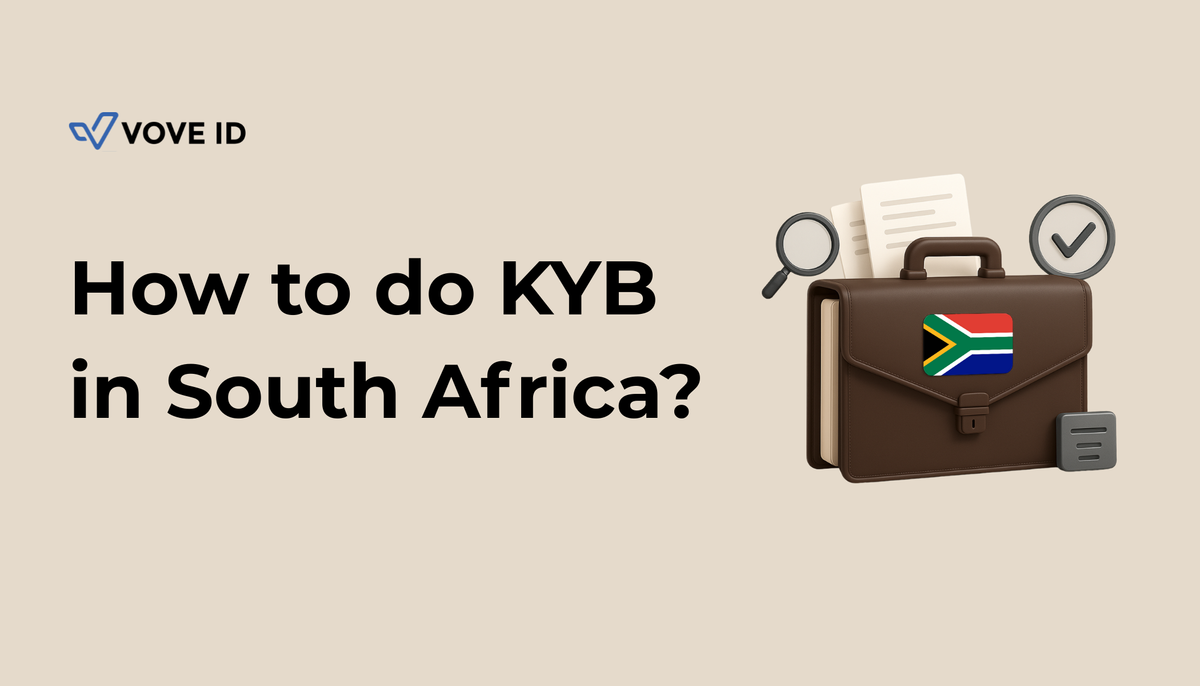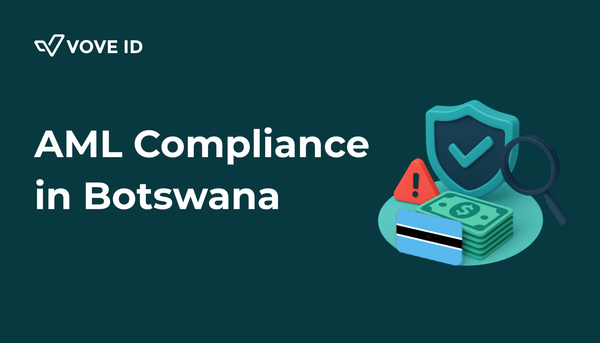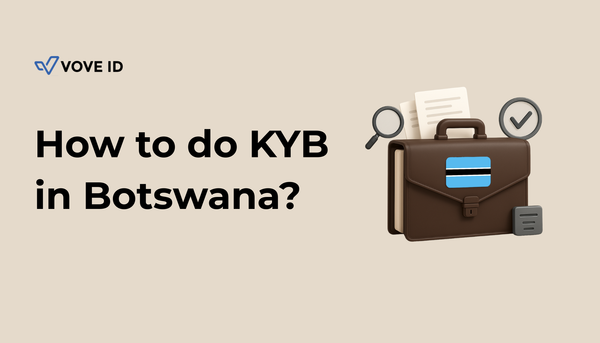How KYB Is Powering South Africa’s Business Growth
Master KYB South Africa with VOVE ID’s AI-powered solutions. Ensure FICA compliance, verify partners, and thrive in a $405B economy. Book a demo now!

South Africa’s Economic Engine and KYB’s Role
South Africa, Africa’s second-largest economy with a GDP of $405 billion in 2023, is a hub for fintech, mining, and SMEs. Johannesburg’s bustling markets drive innovation, but risks like fraud and money laundering loom large. KYB (Know Your Business) ensures that business verification aligns with the Financial Intelligence Centre Act (FICA) of 2001, with stricter enforcement in 2025. AI-driven KYB solutions like VOVE ID streamline compliance, fueling this vibrant economy.
What KYB Means for South Africa
KYB verifies a business’s legitimacy, ownership, and operations, safeguarding South Africa’s financial system. It’s mandated by FICA and overseen by the Companies and Intellectual Property Commission (CIPC) and Financial Sector Conduct Authority (FSCA). From Cape Town startups to Pretoria enterprises, KYB builds trust and meets global Financial Action Task Force (FATF) standards.
Why KYB Matters
KYB delivers:
- Fraud Prevention: Shell companies fuel financial crime, KYB exposes them via ownership checks.
- Compliance: FIC data notes fines up to R100 million (~$5.5 million USD) in 2023 cases.
- Trust: Verified firms attract $1.2 billion in 2023 FDI.
KYB underpins economic stability.
KYB in Action: B2B Lending in Joburg’s Fintech Scene
Consider TradeCore, a hypothetical Johannesburg fintech building a B2B lending platform. It submits its CIPC registration (e.g., CK document) and verifies directors using South African IDs. Onboarding rural suppliers, often unregistered, poses challenges. Transactions over R24,999 (~$1,400 USD) trigger FIC reporting. “KYB automation slashed our vendor checks by 70%,” says TradeCore’s compliance head. AI-driven KYB ensures AML compliance in South Africa. Explore how KYB works in West Africa in our Nigeria KYB Guide.
Key KYB Requirements
For KYB South Africa, businesses must meet stringent documentation and oversight standards:
- Registration: A CIPC certificate (CK1 for companies, CK2 for close corporations) or registered business name, proving legal formation. Non-compliance risks reregistration, impacting 15% of SMEs annually, per CIPC audits.
- Ownership: Details of directors and shareholders, verified via Smart ID, Green Book, or passport. This includes tracing ultimate beneficial owners (UBOs) to comply with FATF’s 25% ownership threshold.
- Address: A utility bill, lease agreement, or bank statement, under three months old, to confirm physical operations. Rural firms often struggle here, relying on affidavits.
- Screening: Cross-checks against CIPC’s deregistered list, FSCA sanctions, and FATF watchlists to flag high-risk entities like PEPs or sanctioned firms.
- Monitoring: Continuous tracking of transactions exceeding R24,999 (~$1,400 USD) for patterns like rapid fund transfers, per FIC guidelines.
How KYB Works
A robust KYB process ensures compliance through structured steps:
- Data Collection: Compile CIPC documents (e.g., CoR 14.3 registration), Tax PIN, and ownership structures, including UBO disclosures for complex entities like trusts.
- Verification: AI cross-checks CIPC, Home Affairs, and SARS databases, achieving up to 95% accuracy with quality data. For instance, biometric scans confirm director identities against ID photos.
- Risk Assessment: Screen for sanctions, adverse media, or fraud signals, such as mismatched UBOs or irregular CIPC filings, using global and local risk databases.
- Ongoing Review: Update records for changes in directorship, shareholding, or registration status, with automated alerts for expired documents or new sanctions.
Tech Powering KYB
AI transforms business verification processes in South Africa, streamlining compliance:
- Speed: Real-time CIPC lookups slash verification from days to minutes, critical for high-volume fintechs onboarding hundreds of vendors daily.
- Accuracy: Biometrics and OCR validate director IDs against Home Affairs, reducing errors to under 5% in optimal conditions, per industry benchmarks.
- Scale: Digital profiles integrate with FIC and FSCA systems, enabling seamless reporting for firms handling thousands of transactions.
Industry estimates show 60% of South African firms adopted tech-driven KYB by 2024, up from 25% in 2021, driven by Joburg’s fintech surge and FSCA’s push for digitization.
South Africa’s KYB Framework
The KYB landscape is shaped by layered regulations:
- CIPC Registration: Mandatory under the Companies Act 2008, with over 2 million entities registered by 2024, per CIPC data. Non-compliance risks fines or forced dissolution.
- AML Rules: FICA 2001, amended in 2017, mandates enhanced due diligence for high-risk sectors like mining or fintech, requiring UBO tracing and PEP screening.
- POPIA 2013: Protects data privacy, demanding explicit consent for sharing director or supplier details, with non-compliance fines up to R10 million (~$550,000 USD).
South Africa’s 2023 FATF grey list exit reinforced global alignment, with FSCA’s 2024 guidance stating, “Digital risks demand stronger KYB to protect markets.”
KYB Challenges
South Africa’s KYB landscape faces hurdles:
- Data Gaps: Rural businesses often lack CIPC records, only 40% are fully digitized, per industry estimates. Mobile KYB units help but lag in scale.
- Fraud: Synthetic entities exploit gaps, AI flags fakes but needs updates.
- Privacy: POPIA’s consent rules add operational steps for SMEs, especially when collecting and storing director or supplier data digitally.
Benefits of Strong KYB
Effective KYB South Africa offers:
- Credibility: Verified firms gain credibility in Joburg’s competitive markets, attracting key partnerships.
- Growth: Supports $1.2 billion FDI by easing compliance.
- Security: Blocks illicit flows, cutting FIC scrutiny risks.
- Faster Onboarding: Streamlines vendor checks, boosting efficiency for B2B platforms.
Take Action
Navigating South Africa’s KYB landscape can be complex, but compliance doesn’t have to be a burden. VOVE ID provides businesses with seamless, automated KYB solutions designed to ensure compliance without compromising efficiency. Explore our compliance tools today and future-proof your business strategy.




